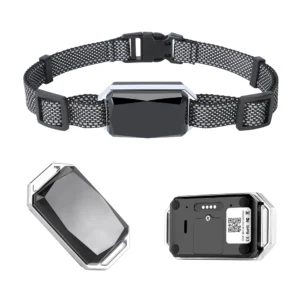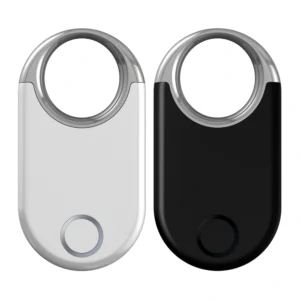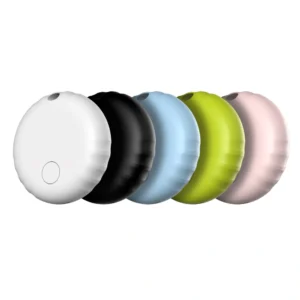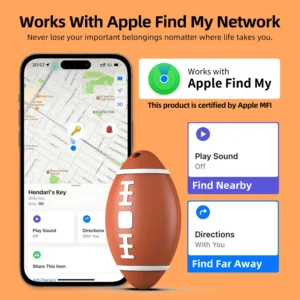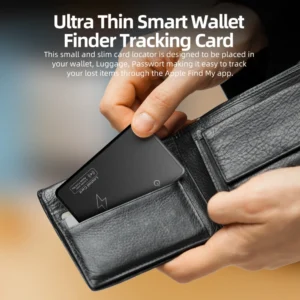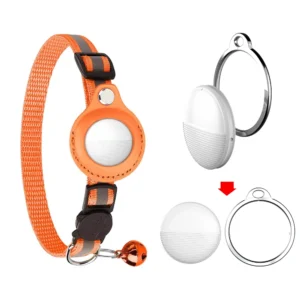What is a GPS Tracker? Definition, principle and core analysis
GPS Tracker is a kind of electronic device which can determine, record and trace the target position based on Global Positioning System (GPS) . Its core value is to obtain high-precision geographic location data (longitude, latitude, altitude) by directly receiving satellite signals, it is widely used in vehicle management, PET monitoring, personnel security (such as the elderly/children) , valuables anti-theft and other scenarios.
![]()
Key differences: GPS Tracker vs. Bluetooth anti-drop devices (e.g. , AirTag)
Many people confuse a GPS Tracker with a Bluetooth anti-lost device, but there are fundamental differences in how they are positioned and where they work. The key differences are:
| Dimensions of contrast | GPS Tracker | Bluetooth anti-drop devices (e.g. AirTag, Tile) |
| Positioning principle | Receive GPS satellite signal directly, complete positioning independently | It relies on a network of nearby bluetooth-enabled devices, such as mobile phones, to report its location indirectly |
| Coverage | Global coverage (unobstructed scenes) | Limited to“Bluetooth-enabled” areas (e.g. , urban, remote) |
| Core hardware | A GPS chip must be built in | Bluetooth chip only, no GPS module |
| Power and battery life | High power consumption, independent power supply (battery/car/solar) | Low-power electronics, Button batteries for months |
The core composition of GPS Tracker: 4 key conditions
Not all“Location trackers” are GPS trackers. A true GPS Tracker must satisfy all four of the following core requirements:
1. Core hardware: GPS module (required)
The“Soul” of the GPS Tracker is the GPS receiver chip, which is essentially what sets it apart from other tracking devices:
![]()
How it works: it needs to receive signals from at least 4 GPS satellites at the same time (3 satellites determine longitude and latitude, and the 4th satellite calibrates altitude and time to achieve 3D positioning)
The core role: the satellite transmission of the original signal into computable coordinates of the geographical location;
Key judgment: if the device has no independent GPS chip and only relies on network-aided positioning such as Bluetooth and WI-FI, it is not a GPS Tracker.
2. Core functionality: data parsing and processing capabilities (required)
GPS satellites transmit raw electrical signals that can not be understood directly by the user, so the device needs independent data-processing capabilities:
![]()
Core tasks: the GPS module to obtain latitude and longitude coordinates, parsed into“Map can display the point”, “Text location information”(such as XX Street XX near) ;
Common mistake: some low-cost devices that claim to“Support GPS positioning” don’t actually have separate parsing chips and rely on external devices (such as cell phones) to process data — essentially“GPS receivers.” Rather than a“GPS Tracker.”.
3. Core value: location storage or transfer capability (Either/or)
“Location” is the foundation, but“Letting users know where they are” is the core value of the tracker, and it can be done in two ways:
| Type | How It’s done | Advantages | Scenarios |
| Real-time transport | It relies on networks such as SIM cards (2G/4G/5G) , eSIM, NB-IoT and satellite communications to upload location data to the cloud | Real-time, the user can through the mobile App/web page at any time to view | Fleet management, real-time monitoring of elderly/children, logistics tracking |
| Local storage | The trajectory data is recorded in the internal Flash chip or the external SD card, and then exported via USB/Bluetooth | No network, lower power consumption, suitable for no signal scenarios | Outdoor activities (hiking, biking) , wildlife tracking, monitoring of items in off-the-grid areas |
Key note: if the device can only“Self-locate” but can not access the data by any means (storage/transmission) , it does not have a“Tracking” function and can not be called a GPS Tracker.
![]()
4. Basic support: Independent Power Supply
The GPS module consumes much more power than a bluetooth chip (about 10-50 times as much) , so it must have an independent and stable power supply:
Common power sources:
Built-in rechargeable battery for portable applications such as pet tracking and personal locator
In-car power supply (for car trackers, which plug directly into the vehicle’s power supply)
Solar-assisted power (for long-term outdoor use, such as containers and ranching equipment)
Unlike Bluetooth anti-lose devices, which rely on button batteries for months, GPS trackers typically last for days to months, depending on how often you use them and how they’re powered.
In a word: the core criteria of a GPS Tracker
To qualify as a GPS Tracker, a device must satisfy three conditions:
![]()
Hardware: built-in Independent GPS chip, can directly receive satellite signals to complete three-dimensional positioning;
Functional level: the ability to convert the location results into a user-accessible form (local storage or network transmission) ;
Support level: Independent Power Supply System to support the continuous operation of the device.
Common mistake: these“Trackers” aren’t GPS trackers!
Many of the“Anti-loss/tracking devices” on the market are not GPS trackers. Examples include:
Apple AirTag, Samsung Smarttag, Tile preventer: essentially a“Bluetooth preventer” that lacks a GPS chip and relies on a Bluetooth network of nearby phones to report its location, only suitable for short-distance, densely populated areas of anti-lost (such as keys, backpacks) , not a GPS tracker;
WI-FI trackers: rely on a location database of nearby Wi-Fi hotspots, are limited to areas with WI-FI, don’t have satellite positioning capabilities, and aren’t GPS trackers.
Practical Advice: How to choose the right“Tracking device”?
For global coverage and real-time location (tracking cars, monitoring the elderly) , choose a GPS tracker
If you need short-range anti-lost, low-power long-term battery life (such as keys, backpacks) : choose Bluetooth anti-lost device;
For indoor location (children at the mall, merchandise at the warehouse) : choose a Wi-Fi or UWB location device.
According to their own needs to match the positioning principle, in order to select the real application of the device, to avoid confusion“GPS Tracker” and other tracking device concept.

